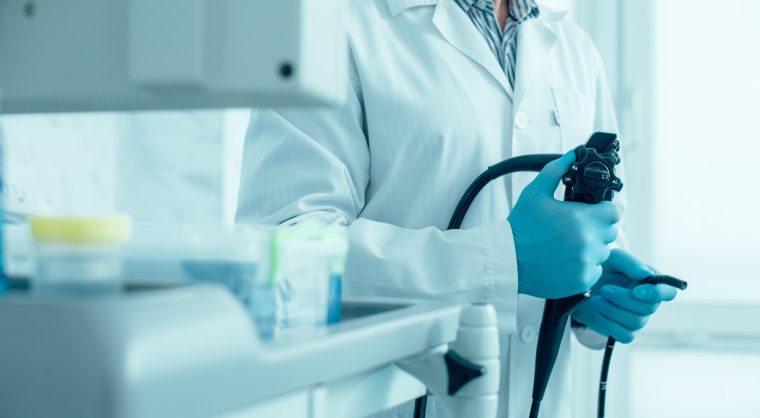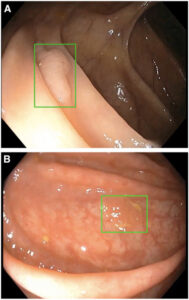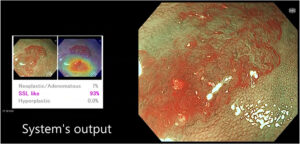AGA’s newest Clinical Practice Update provides expert commentary on the current landscape of artificial intelligence (AI) in the evaluation and management of colorectal polyps.
Screening colonoscopies reduce the risk of colorectal cancer by removing precancerous polyps. Polyp detection is dependent on the eyes of the clinician, with adenoma detection rates (ADRs) ranging widely from 7% to 53% among endoscopists.
Hear from author Dr. Jason Samarasena as he shares what clinicians should know about the safety and efficacy of AI tools in GI endoscopy.
The most important applications of AI computer vision in colonoscopy today include computer-aided detection (CADe) and computer-aided diagnosis (CADx). CADe is designed to help the endoscopist detect polyps during colonoscopy and CADx is intended to accurately predict polyp histology without the need for a tissue biopsy.
CADe alert box identifying a sessile polyp (A), and flat polyp (B). Images courtesy of Tyler M. Berzin.
CADx demonstrating diagnostic prediction for a suspected sessile serrated lesion. Images courtesy of Yuichi Mori and Masahi Misawa.
The main concern in adopting AI-assisted colonoscopy is the risk of false-positive alerts. The authors recommend clinician-AI collaboration when using technologies such as CADe and CADx. Formalized training is also recommended to ensure endoscopists are using the AI tools effectively and in a way that is enhancing not delaying patient care.
The authors predict that one day an AI suite of tools for colonoscopy will seem indispensable and serve as a powerful adjunct to support safe and efficient clinical practice. AI tools that improve colonoscopy quality may become more accepted, and perhaps demanded, by payors, administrators, and possibly even by well-informed patients who want to ensure the highest-quality examination of their colon.
Read the full AGA Clinical Practice Update on Role of Artificial Intelligence in Colon Polyp Diagnosis and Management: Commentary, published in the December issue of Gastroenterology.















